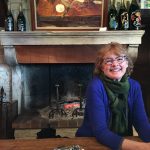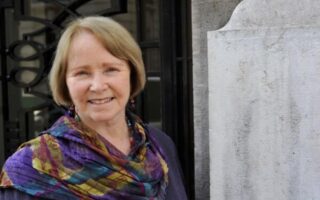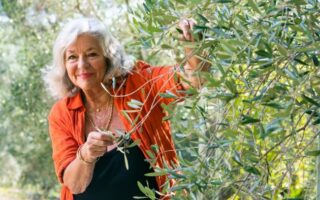Will There Be Wine? Q&A with Author Whitney Cubbison
Whitney Cubbison is a dual American and French citizen who has been living in Paris since 2009. She grew up in Texas and California, and graduated from UCLA with a degree in French. Her career in communications began at high-tech PR agencies in San Francisco; eventually she joined Microsoft, where she worked for 16 years, 13 of them from the Paris office, filling various international roles in public relations, employee communications, executive speechwriting, and social media.
She earned her French citizenship in early 2022 and left Microsoft that summer to focus on completing her first novel, Will There Be Wine? The story, while fiction, is deeply inspired by Whitney’s own experiences as an ex-pat divorcée living in Paris.
Whitney recently took the time to answer Janet Hulstrand’s questions about her life in Paris and her new book in this exclusive interview for Bonjour Paris. You can also watch her recent conversation with Sylvia Davis on Bonjour Paris Live.
Janet Hulstrand: First, the most obvious question: how autobiographical is this book?
Whitney Cubbison: The book is “deeply inspired by real events.” 😊 Like Austen, I’m an American expat divorcée in Paris who, prior to writing this book, once worked as a corporate speechwriter for a large technology company. However, the book is a novel and not a memoir for a reason! There is a fair amount of fiction woven in to make it work as a novel. That said, I will admit one thing. There are three chapters in the book called “The Internet” (Rounds 1, 2 and 3) which are all mini-vignettes of horrible first dates “Austen” went on thanks to the wretched dating apps. Those dates all happened (to me!) almost to the letter of how they were described in the book. It’s a dating jungle out there, and sometimes the truth is stranger than fiction! It was from those experiences that the idea of writing this book was born.
Janet: You deal with this matter in your novel: but in your experience, what are some of the main differences between the way the French view dating and the way Americans do? What is particularly important for Americans who are entering the French dating scene to know and understand? Are there any traps that can be avoided in the cultural minefield of dating in France?
Whitney: The first thing to know is, there is no word for “dating” in the French language. That says a lot, no?! Most traditionally, the French style is that people meet — either through school, work, or friends — get to know each other, usually in group settings, and then one day, fall into bed together and wake up as a couple the next morning. In the U.S., people meet, go on dates and can even be sleeping together for months, but until they have “the conversation” about whether they’re exclusive, they’re not. This is not how it works in France. Dating apps are obviously changing the French dating culture a bit as many people now meet online, but “the conversation” isn’t a thing in France. Once you sleep together (or sometimes as soon as you kiss!), you’re considered a couple. Of course, if the sex happens very quickly, you might also just be a one-night stand, but you’ll know either way by the next morning. It’s actually much less complicated than the American way, although it can be a real shock to the system if you’re not aware of this cultural nuance.
In Will There Be Wine? Austen wakes up one morning in October after her first night with a hunky new Frenchman (whose last name she still hasn’t even learned) and is shocked when he immediately starts talking about vacation plans for the Christmas holidays! But this is the French way!
Janet: Dating conventions aside, I think your novel does a really good job of highlighting one of the most important cultural differences between the French and Americans. Namely, the matter of optimism/pessimism. Do you want to say a word about this? Also, where do you think this difference comes from? What is the reason for it?
Whitney: Americans are raised on the idea of “The American Dream” – work hard and anything is possible. It doesn’t matter what (or if) you study at university or where you grew up. If you want something bad enough and are willing to make the effort, (almost) any door can open for you. It engenders a certain optimism.
In France, things are much more codified. Kids must choose their academic path while they’re still in high school, and it’s very difficult (if not impossible) to change it. What school you went to in France matters deeply when it comes to employment and your eventual place in society. In many ways, your path is chosen for you, before you’re ever “adult” enough to know if it’s the path you really want. My outsider impression is that this leaves many people feeling disenchanted whenever they do start to figure life out for themselves. I also think it creates a very limiting way of understanding the world. People see what they want to see, and when they believe they know what to expect of others before ever getting to know them, it doesn’t leave much space for surprise and delight, which I think are true roots of optimism.
In the book I quote a French writer, Sylvain Tesson, who famously said, “La France est un paradis peuplé de gens qui se croient en enfer” (“France is a paradise inhabited by people who believe they’re in hell.”) He came to this conclusion after extensive travels abroad, through which he came to understand how good life is in France—universal healthcare, excellent public education, heavily subsidized childcare, remarkable unemployment benefits, not to mention all the incredible food, wine, and culture. Despite it all, he correctly noticed that the French are often wildly pessimistic.
It’s a shame, given all the advantages of living in France, but as Monsieur Tesson points out, the more you travel, the more you know!

©Whitney Cubbison
Janet: I loved the chapter toward the end of the book where Austen is reflecting on her past relationships and wondering about what she is really looking for in future ones–and what might work better. There are two images she considers–one is the idea of people being divided into orchids and weeds, and the other one is the difference between “quiet” and “loud” love. It occurs to me that these two images, and this kind of reflection, could be helpful for anyone who is seriously considering the quality of their relationships—and not just romantic relationships. Where did these images come from? Are they original to you (or to Austen) or is there some other interesting source?
Whitney: My cousin Robyn, who is a partial inspiration for the Liz character in the book, was the person who gave me her “orchids versus weeds” view on people, when I was getting divorced back in 2011. It really resonated with me and gave me a needed boost of confidence (for I am a weed), at the time I was nervously looking ahead at the unknowns of my post-divorce life. For those who haven’t read the book yet, here’s the snippet:
[Austen] recalled a conversation she’d once had with Liz about adaptability and resilience.
“There are two kinds of people in this world: orchids and weeds,” she had explained. “Orchids need very particular circumstances and care to thrive. They’re finicky and delicate and ephemeral. Then, there are weeds. Those things can grow and thrive anywhere, no matter the conditions. You, my friend, are a weed.”
Austen had nodded, instantly understanding.
“You are wired to choose happiness, and you will thrive no matter where you find yourself. That’s a gift that will serve you well in life,” Liz had told her.
As for “loud love versus quiet love,” that’s something I came up with while writing the book. While the story is a “romcom” first and foremost, I wanted it to have a good amount of introspection as well, as the character goes on an internal journey about what she wants and needs from others. So much of that is rooted in how you were raised, so I wanted her to reflect on the different kinds of love she knew as a child. There are many ways to love and to be loved, and I’m thrilled this concept resonated with you! Here’s the excerpt:
Her mother was an extrovert like her, and she had always loved Austen loudly. She couldn’t resist telling every person she met that her daughter lived and worked in Paris as a successful corporate speechwriter. She would tell the checkout girl at the grocery store if she could find a way to work it into their brief conversation. She was incredibly proud and told Austen every time she had the chance.
Austen’s father, on the other hand, loved her quietly. He was an introvert who rarely said much. As a child, she felt loved through his actions, but she craved hearing the words.
She had a distinct memory of the first time she told her dad she loved him. She was 12 years old. Her parents had put her to bed, but she’d lain awake for 20 minutes listening through the wall to the TV show that he was watching, working up her nerve.
When she finally came out of her room and peeked her head around the corner to say those three little words, he reacted simply. “I love you too, sweetheart. Now go back to bed.”
At age 40, she questioned why her 12-year-old heart had needed to hear it so badly that night. Perhaps being loved loudly felt safer, less difficult to doubt.

©Whitney Cubbison
Janet: What made you decide to take that leap of faith that is required to quit a “perfectly good” full-time job and go out on a limb as a novelist?
Whitney: I had a fantastic 16-year run working at Microsoft. My last role there was running Communications for Western Europe, a territory spanning 14 countries. Before Covid, I was on a plane almost every week, flying between countries to meet my teammates and manage the business. I loved it. And then Covid hit and I was grounded at home for two years.
The good news about being stuck at home is that you can get a lot of writing done. The bad news (for me) is that I am a wild extrovert and single, so being stuck alone in my apartment was quite tough on my mental health. Then, right as the pandemic restrictions were lifting, I lost my dad. It was an exceptionally crappy few years, and when I returned to work after my dad’s passing, I realized I’d lost all the joy I once felt in the work I was doing.
I knew I needed a break and an opportunity to shift my mind onto something else, and I had a sneaking suspicion that I’d rediscover my joy in the pages of my unfinished novel. I’d already completed the second draft by the time I left Microsoft, so I decided to jump into that world with both feet as a total reset, and I’m so glad I did.
Janet: What was one of the most surprising things you learned about writing fiction in the process of writing your book?
Whitney: Having spent my entire career as a writer in Corporate Communications, I thought I knew how to write. I thought I was pretty good at it too! But it turns out that the skillset one hones in that type of job – namely synthesizing the complex into something that anyone can understand in two minutes, two soundbites, or less – doesn’t serve you particularly well as a novelist. I differentiate them as writing for a transaction (a sale) versus writing for a feeling (taking the reader on an emotional journey). In the end, it was a rather steep learning curve to get into novelist mode, but I deeply enjoyed the journey.
Janet: What was the thing you loved the most about writing this book? What was the most challenging?
Whitney: Easy answer segue from the previous one – it was the learning journey! Somehow, figuring out how to turn a string of random real-life anecdotes into a cohesive novel was both the most challenging and the most fun part of this process. I worked with two fantastic freelance book editors at different stages of writing this book, and each one taught me some invaluable lessons in fiction writing. Taking in and implementing their incredible feedback and watching my story roar to life on the page was so much work and also a true delight. I definitely underestimated that task when I was getting started, but I’m so glad I got the help of these two amazing professionals and stuck with it until the end.
Janet: Your advice for aspiring novelists? For aspiring oenophiles? For those who are hoping to find true love–in Paris, or anywhere?
Whitney: Well those are three different questions entirely, so let’s take them one by one!
For aspiring novelists… just start writing and then keep writing. I wasn’t sure if my random anecdotes would ever become a novel when I first started putting them to paper. It was only when I was deep into the writing process that I was sure I had a story that deserved to be told. And once you think you’ve got the story down, hire professional editors to help make it the best it can be. You will always be too close to your own work to see how it can be improved.
For aspiring oenophiles… just start drinking and then keep drinking? OK maybe that’s bad advice! 🤣 Move to France? Perhaps impractical advice…! So let’s go with this. Take a wine appreciation course or two! They’re a great way to learn and a great place to make new friends, which leads me to question three.
For those hoping to find love… doing group activities with people who have shared interests is a great place to start. Even if you don’t meet the love of your life, you’re still doing something fun and probably learning something new in the process. Also—and probably the best advice I can give—don’t take advice from me. I’ve been single FOREVER.😊 If any readers have great advice on this topic, I’m all ears!

©Whitney Cubbison
Janet: What is your favorite thing to do in Paris? Or maybe your second-favorite thing? After sitting in wonderful cafés and enjoying wine? 🙂
Whitney: Second favorite thing then…! I love walking around and taking pictures. Paris is the most beautiful city in the world, in my humble opinion. I’ve lived here since 2009, and I never get bored of it. Paris is an infinite canvas!
From last November until early April, I shared a 99-image visual storytelling journey through the book on my Instagram and on my public author page on Facebook, posting pictures from the real locations where various scenes take place and giving a bit of context to the location. In reality, that visual storytelling journey continues even today as I had more than 99 images I wanted to share, but they’re coming in a bit more sporadically now into my feed. If you like Paris pictures, follow me there, and scroll all the way back to the image of the beautiful light blue Parisian door, which was the first image in that visual storytelling trail.
Janet: So what’s next for Whitney Cubbison? Is there another novel coming? And if so, will Austen be in it? Or will we meet a new cast of characters? And what about a film version of Will There Be Wine? 🤔
Whitney: There are always ideas percolating, but I haven’t yet(!) committed to any of them. I have decided that if I write a sequel to Will There Be Wine? it’ll be called We’re Going To Need Another Bottle.
This isn’t a storyline so much as a construct, but since WTBW is a story that stretches out over the course of four years or so, I decided that I’d love for a next book to take place in one week or weekend. I like the challenge of trying to do something on a much more compressed storytelling timeline that’s very dialogue driven. But we’ll see!
And as for getting a film version of this book… from your lips (or keyboard, I suppose) to God’s ears! I’m waiting by the phone for Hollywood to call! 😊
BONUS: Whitney has put together a Google Map Collection which is a guide to all the Paris bars and restaurants mentioned in the book. It has a small snippet from the scene associated with each spot.
Lead photo credit : ©Whitney Cubbison




